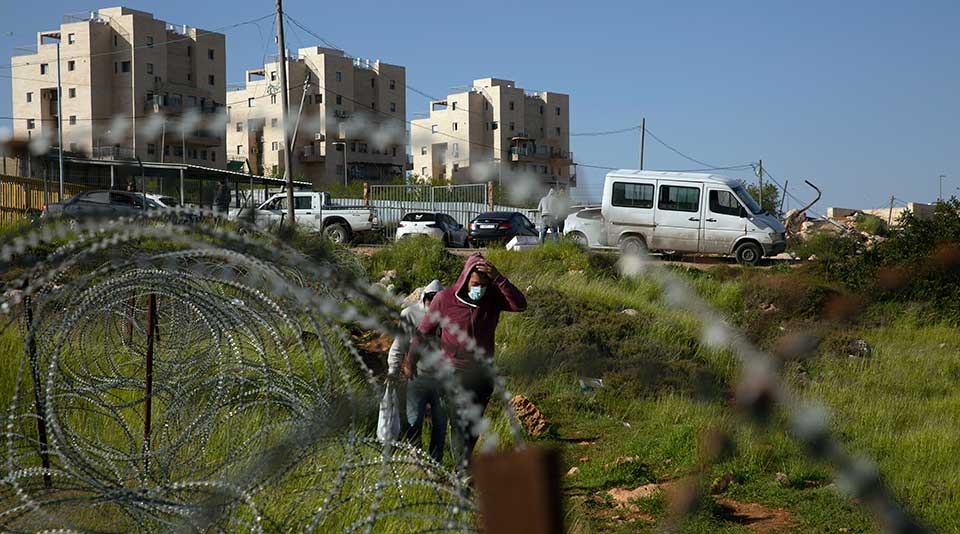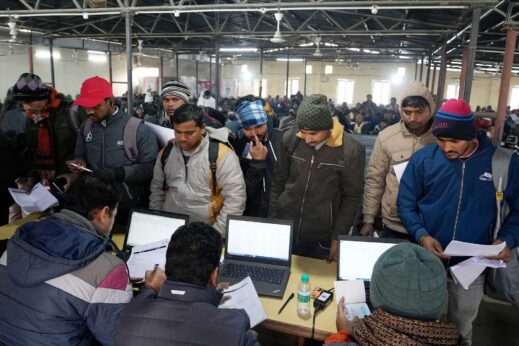
In the shadow of Israel’s genocidal war on Gaza and the continued strangulation of Palestinian life under occupation, another, quieter form of violence is taking shape against Palestinian workers. In recent months, Israel has begun an aggressive campaign to replace hundreds of thousands of Palestinian workers with migrant laborers from Asia and Africa.
This labor shift is not occurring in a vacuum; it reflects broader historical patterns in how Israel has managed its labor force over the decades. Since the occupation of the West Bank and Gaza began in 1967, Palestinian workers have played a crucial role in Israel’s economy, particularly in construction, agriculture, and low-wage service jobs.
For decades, Israel maintained a policy of allowing Palestinians to work inside the Green Line, but with highly controlled permits and under strict surveillance. These labor arrangements served a dual function: They provided cheap labor to Israeli businesses while maintaining a form of economic dependency that can be adjusted or revoked as a political tool.
This system began to shift after the Second Intifada in the early 2000s, when Israel increasingly turned to foreign migrant labor, primarily from Asia and Eastern Europe, to reduce its reliance on Palestinian workers. The events of Oct. 7, 2023, and the subsequent full-scale war on Gaza dramatically accelerated that shift.
Israel cited security concerns to revoke the work permits of hundreds of thousands of Palestinians almost overnight, crippling the Palestinian economy and putting entire communities out of work. Many of those affected had worked for years in Israeli companies without formal protections or pathways to unionize.

In place of the Palestinians, Israel has pursued bilateral labor agreements with countries such as India, Thailand, Malawi, Sri Lanka, and others. These deals promise to bring tens of thousands of new workers into Israel’s agriculture, construction, and caregiving sectors. While officially framed as mutually beneficial programs offering employment and skills training, labor rights organizations argue that these arrangements leave workers exposed to abuse.
Many migrants pay steep recruitment fees in their home countries, entering Israel already in debt. Some have reported having their passports confiscated, being housed in substandard conditions, and receiving wages below the Israeli legal minimum.
One of the most concerning aspects of this labor importation system is its lack of oversight. While Israel’s Ministry of Labor technically regulates working conditions, enforcement is often weak, especially at remote farms and construction sites. NGOs like Kav LaOved have documented numerous cases of labor law violations, including wage theft and physical abuse. In the agricultural internship program alone, at least 17 foreign “trainees” have been recognized as victims of human trafficking, and several deaths have occurred since the program began.
For Palestinian workers, the consequences of replacement extend beyond economic loss. Many had come to rely on Israeli wages as a lifeline in a context where the occupied territories face chronic underdevelopment, high unemployment, and movement restrictions that stifle local economic growth.
The revocation of work permits not only cuts off income, but it also further entrenches the fragmentation of Palestinian society. Financial burdens increase across the territories, and dependency on international aid deepens.
At the same time, the Israeli economy, particularly in sectors like construction and agriculture, is feeling the strain of the missing Palestinian workforce. Reports in the Israeli business media have noted project delays and labor shortages, prompting companies to push for faster recruitment of foreign workers. This has created a situation where foreign labor is seen not just as a stopgap but as a strategic alternative—a way to maintain economic continuity without political “risk.”
This dynamic illustrates a deeper structural issue: the commodification of labor within an apartheid context. In place of Palestinian workers, whose presence is politically fraught, Israel is turning to foreign migrants who can be more easily controlled, deported, and denied political agency. This reduces labor to a transactional good—one that can be imported or removed at will, without consideration of the human cost.
Meanwhile, international criticism has grown. In 2024, the International Labour Organization (ILO) received a formal complaint filed on behalf of Palestinian workers who were denied wages and labor rights following the war in Gaza. The complaint accuses Israel of violating international conventions on the right to work and collective bargaining. However, practical consequences for Israel remain limited, as major donor countries and trade partners continue to prioritize political alliances over labor rights enforcement.
These developments reveal how Israel’s labor policy—shaped by occupation, security doctrine, and neoliberal economics—has profound implications for both Palestinians and the growing population of migrant workers from other countries. The replacement of one vulnerable workforce with another highlights the cruelty of the Israeli apartheid system as it simply reconfigures the labor market in ways that serve state and corporate interests while masking the continuity of exploitation.
Moving forward, Israel’s labor strategy will increasingly depend on imported workers, particularly as it seeks to insulate its economy from the political costs of occupation and intensify its apartheid and genocidal policies. For now, the Palestinian workforce remains sidelined, and the migrant workers who fill the gap inherit the same system of weak protections, legal gray zones, and systemic disregard for human dignity.










